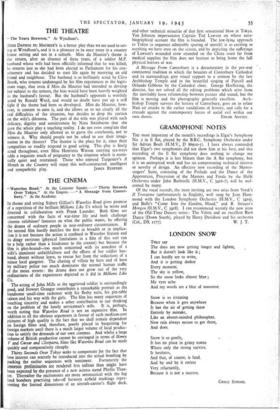THE CINEMA
" Waterloo Road." At the Leicester Square. " Thirty Seconds
Over Tokyo." At the Empire. " A Message from Canter- bury." At the Academy.
IN theme and setting Sidney Gilliatt's Waterloo Road gives promise of a repetition of the brilliant Millions Like Us which he wrote and directed in collaboration with Frank Launder. Both films are concerned with the facts of war-time life and both challenge cinema exhibitors' fantasies on what the public wants, by offering the drama of ordinary people in near-ordinary circumstances. If the second film hardly matches the first in breadth or in implica- tion it is not because the action is confined to Waterloo Station and its dingy environs (physical limitations in a film of this sort can be a help rather than a hindrance to the creator) but because the film is plot-bound—too much concerned with its anecdote of a wife's imminent unfaithfulness and the efforts of her soldier hus- band, absent without leave, to rescue her from the seductions of a minor local gangster. The chasing of villain by hero and of hero by military police too much dominates the normal human traffic of the mean streets: the drama does not grow out of the very ordinariness of the experiences depicted as it did in Millions Like Us.
The acting of John Mills as the aggrieved soldier is outstandingly good, and Stewart Granger contributes a remarkable portrait as the handsome small-time racketeer with his flashy suits, his pin-table saloon and his way with the girls. The film has many sequences of touching sincerity and makes a sober contribution to our thinking
on the problem of the lonely serviceman's wife. It is, perhaps, worth noting that Waterloo Road is not an expensive film. In addition to all the obvious arguments in favour of such medium-cost pictures of high quality is the fact that we shall remain dependent on foreign films and, therefore, poorly placed in bargaining for foreign markets until there is a much larger volume of local produc- tion to satisfy the demands of our own cinemas. And whilst a large volume of British production cannot be envisaged in terms of Henry V and Caesar and Cleopatra, films like Waterloo Road can be made quickly and comparatively cheaply. Thirty Seconds Over Tokyo seeks to compensate for the fact that love interest can scarcely be introduced into the actual bombing by Packing the earlier sequences with sentiment. Fortunately the amorous preliminaries are rendered less tedious than might have been expected by the presence of a new actress namd Phyllis Thax- ter. Thereafter the excitements are more aeronautical with the big land bombers practising take-off between airfield markings repre- senting the limited dimensions of an aircraft-carrier's flight deck,
and other technical minutiae of that first sensational blow at Tokyo. Van Johnson impersonates Captain Ted Lawson on whose auto- biographical account the film is founded. The low-lying approach to Tokyo (a sequence admirably sparing of speech) is as exciting as anything we have seen on the screen, and by depicting the sufferings of Lawson's wounded crew stranded on the China coast far from medical supplies the film does not hesitate to bring home the full physical horrors of war.
A Message From Canterbury is a documentary in the pre-war continental tradition in which the beauties of Canterbury Cathedral and its surroundings give visual support to a sermon by the late Archbishop Temple and to the beautiful singing of Purcell and Orlando Gibbons by the Cathedral choir. George Hoellering, the director, has not solved all the editing problems which arise from the inevitably loose relationship between picture and sound, but the film is moving and the photography generally excellent. Arch- bishop Temple surveys the history of Canterbury, goes on to relate Nazi air attacks to the earlier vandalisms of history, and calls for a crusade against the contemporary forces of social evil within our


























 Previous page
Previous page